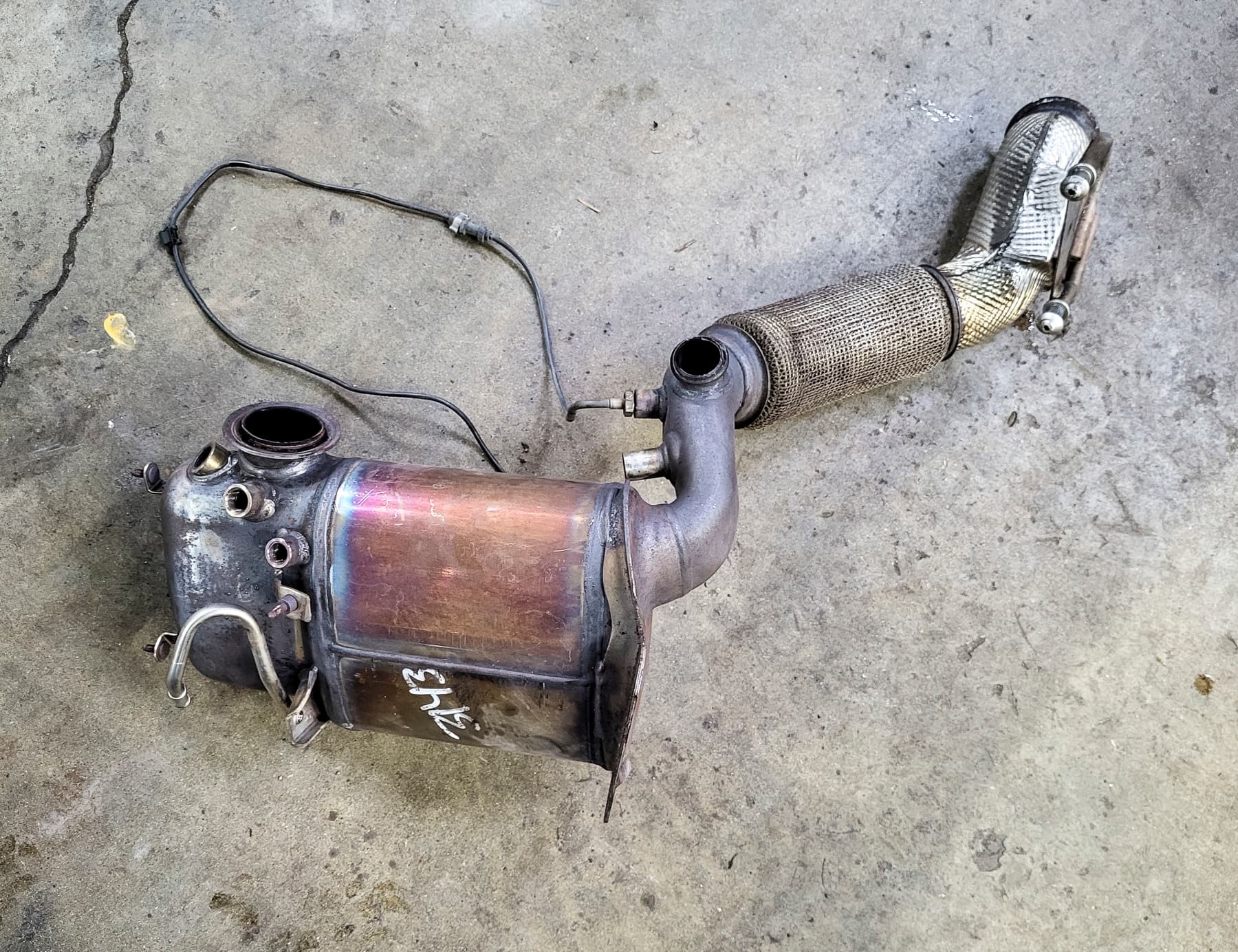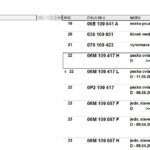If you’re experiencing issues with your VW Jetta TDI, especially a model from around 2010, you might be facing problems with your diesel particulate filter (DPF). At Pawlik Automotive, Vancouver’s trusted auto repair shop, we’ve seen our fair share of these issues. In this guide, we’ll delve into a recent case involving a 2010 VW Jetta TDI and its DPF, providing you with insights into diagnosis, replacement, and maintenance to keep your diesel running smoothly.
Understanding the Diesel Particulate Filter (DPF)
So, what exactly is a DPF and why is it important in your VW Jetta TDI? A DPF, or diesel particulate filter, is a crucial component in modern diesel vehicles designed to reduce harmful emissions. Older diesel engines were notorious for emitting black, sooty particles – these are not only unpleasant to breathe but are also carcinogenic. The DPF’s job is to trap these particles.
Think of it as a sophisticated filter in your exhaust system. As exhaust gases flow through the DPF, it captures soot and particulate matter. However, this isn’t a permanent storage solution. To prevent the filter from clogging, the system initiates a process called “regeneration.”
During regeneration, extra fuel is injected into the engine, raising the exhaust temperature significantly. This high heat effectively burns off the accumulated soot, converting it into ash. This ash is then expelled in a much less harmful form. Essentially, the DPF acts like a self-cleaning oven for your exhaust system.
Diagnosing VW Jetta TDI DPF Issues
In the case of the 2010 VW Jetta TDI that came into our shop, the owner was experiencing a check engine light and performance issues. Initial scans revealed codes related to the DPF and EGR (Exhaust Gas Recirculation) flow. However, diagnosis often goes beyond simply reading codes.
Our process involved:
- Scan Tool Diagnostics: We used a scan tool to read the fault codes and monitor live data from the engine and exhaust system. This helps us understand how the DPF and related sensors are performing.
- Visual Inspection: We visually inspected the DPF system and associated components for any leaks, damage, or obvious signs of blockage.
- Performance Testing: We assessed engine performance to see if it was consistent with a clogged DPF. Reduced power and efficiency can be indicators.
In this particular Jetta TDI, we initially addressed some temperature sensor issues that were triggering codes. While this resolved the problem temporarily, the symptoms returned. Further investigation revealed that the DPF itself was significantly clogged, hindering proper engine performance and triggering fault codes again.
 A close-up view of the old diesel particulate filter (DPF) removed from a 2010 VW Jetta TDI, showcasing soot buildup and the inlet/outlet points, during a replacement service.
A close-up view of the old diesel particulate filter (DPF) removed from a 2010 VW Jetta TDI, showcasing soot buildup and the inlet/outlet points, during a replacement service.
The Importance of the EGR Filter
Another component that often gets overlooked in DPF related issues is the EGR filter. The EGR system recirculates a portion of the exhaust gas back into the intake manifold to reduce NOx emissions. In diesel engines with DPFs, there’s often a filter in the EGR system designed to catch any remaining soot that might bypass the DPF.
When a DPF malfunctions and becomes overly clogged, it can lead to excessive soot buildup in this EGR filter pipe. This pipe, which connects the DPF outlet to the EGR valve, can become restricted, causing EGR flow issues and triggering further problems. In our Jetta TDI case, we determined that both the DPF and the EGR filter pipe needed replacement due to this interconnected issue.
DPF Replacement: A Labor-Intensive Job
Replacing a DPF on a VW Jetta TDI, especially on older models like this 2010, is not a simple bolt-on procedure. It’s a labor-intensive job that often requires specialized knowledge and equipment.
Here’s a glimpse into the process:
- Access: DPF units are typically located underneath the vehicle and can be quite buried within the exhaust system and chassis.
- Subframe Lowering (or Removal): In many cases, accessing the DPF requires lowering or even removing the vehicle’s subframe to create enough working space.
- Component Removal: Various components often need to be removed to access the DPF, including heat shields, exhaust pipes, and potentially other parts of the suspension or drivetrain.
- Sensor Handling: DPFs are equipped with temperature and pressure sensors that need to be carefully disconnected and reconnected. In this case, one temperature sensor was seized and had to be replaced along with the DPF unit.
While some DPF replacements might be relatively straightforward, many, particularly on European vehicles like VWs and BMWs, can be complex and time-consuming. It’s crucial to have the job done by experienced technicians who understand the intricacies of these systems.
DPF Cleaning vs. Replacement
When faced with a clogged DPF, you might wonder if cleaning is a viable alternative to replacement. While DPF cleaning services exist, especially for larger vehicles like trucks and buses, for passenger cars like the VW Jetta TDI, replacement is often the more reliable long-term solution.
Here’s why:
- Thoroughness: Cleaning processes may not always restore the DPF to its original efficiency. They might remove some of the blockage, but not all, potentially leading to recurring issues sooner than with a new unit.
- Longevity: A new DPF unit is designed to last for a significant period. A cleaned DPF’s lifespan is less predictable and may require cleaning again in the near future.
- Warranty and Guarantee: Reputable repair shops typically offer better warranties on new parts compared to cleaned components.
While cleaning might seem like a more budget-friendly option initially, in the long run, DPF replacement often provides better value and peace of mind, ensuring reliable performance and emissions control.
Maintaining Your VW Jetta TDI DPF for Longevity
DPF replacement is an expensive repair. Fortunately, there are steps you can take to prolong the life of your VW Jetta TDI particulate filter:
- Highway Driving: Regular highway driving is crucial. Longer trips at higher speeds allow the exhaust system to reach optimal temperatures for effective DPF regeneration.
- Avoid Short Trips: Frequent short trips, especially in city driving, prevent the DPF from getting hot enough to regenerate properly, leading to soot buildup. If your driving is primarily short trips, a diesel vehicle might not be the ideal choice.
- Regular Oil Changes: Using the correct type of engine oil and adhering to recommended oil change intervals is important for overall engine health and can indirectly impact DPF performance.
- Address Engine Issues Promptly: Engine problems that cause incomplete combustion or excessive soot production can overload the DPF. Addressing issues like faulty injectors or EGR system problems quickly can prevent DPF damage.
DPF Lifespan and Replacement Intervals
While DPF lifespan can vary depending on driving conditions and maintenance, a reasonable expectation for a VW Jetta TDI DPF is around 10 years or more. However, city driving and lack of proper maintenance can significantly shorten this lifespan.
In the case of this 2010 Jetta TDI, at 14 years old, DPF replacement is not unexpected. As these vehicles age, components like the DPF will eventually require replacement.
Reliability of Older VW Jetta TDIs
Despite potential DPF issues as they age, older VW Jetta TDIs, like the 2010 model, are generally considered reliable vehicles. Their diesel engines are robust and fuel-efficient. If properly maintained and driven in suitable conditions (including regular highway driving), they can offer many years of dependable service.
However, like any older vehicle, they are susceptible to age-related repairs. Components like DPFs, EGR systems, and sensors will eventually require attention and potential replacement. If you’re considering purchasing a used older TDI, it’s wise to factor in potential maintenance costs, including the possibility of DPF replacement down the line.
Need VW Jetta TDI Service in Vancouver?
If you’re experiencing DPF problems or any other issues with your VW Jetta TDI in the Vancouver area, the expert team at Pawlik Automotive is here to help. With decades of experience servicing VWs and other European vehicles, we have the knowledge and expertise to diagnose and repair your vehicle efficiently and effectively. Visit our website at pawlikautomotive.com or call us at (604) 327-7112 to book your appointment. We’re always busy, so booking ahead is recommended!
